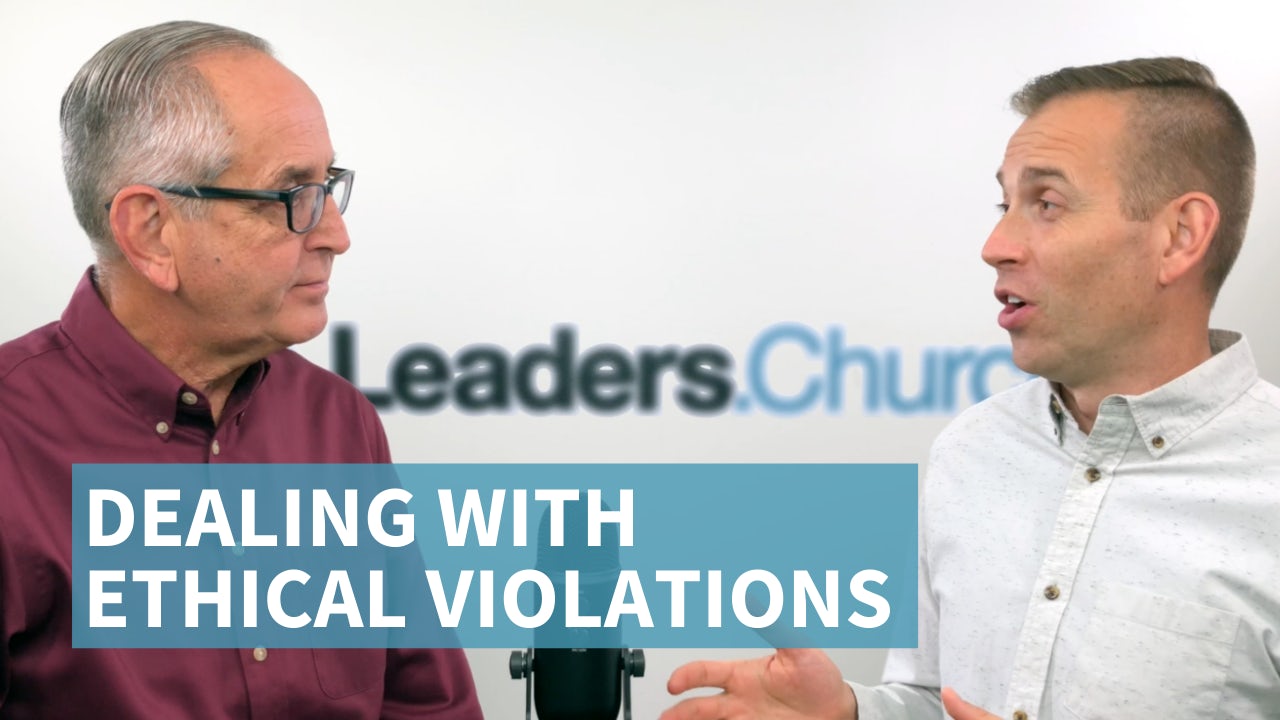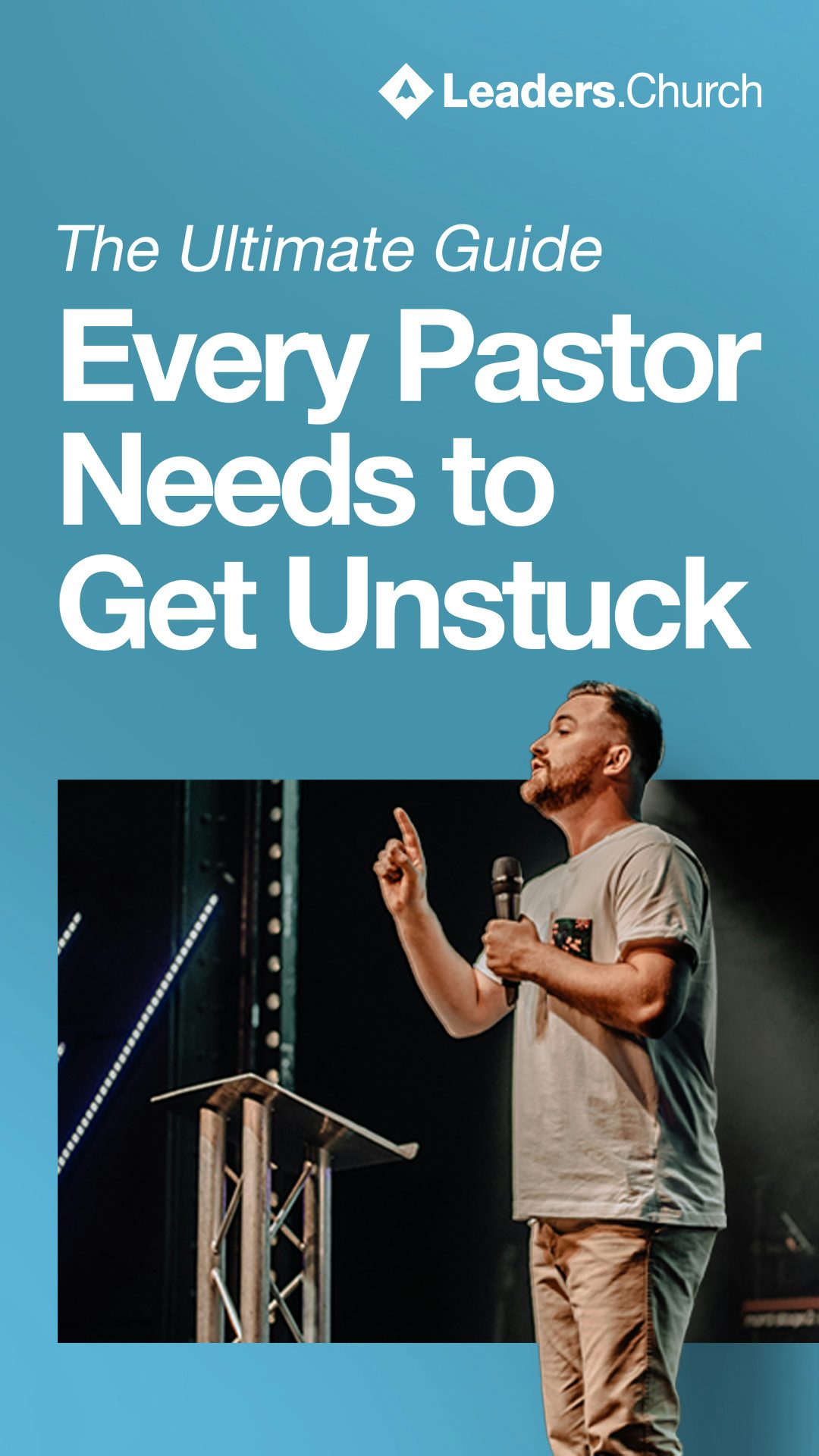087 – Dealing with Ethical Violations
What’s in this Episode?
Have you ever faced a situation in the church where there was an ethical violation of some sort, and you had to deal with the situation and bring resolve to it? Whether it’s a board member, staff member, or key volunteer leader, the reality is, there are times where this may occur. In today’s episode, we’re going to talk about how to deal with a person when they face this type of ethical violation, and what you can do to move forward as a pastor dealing with ethical violations in the Church.
Read the Transcript
Jonathan Hardy
Have you ever faced a situation in the church where there was an ethical violation of some sort, and you had to deal with the situation and bring resolve to it? Whether it’s a board member, staff member, or key volunteer leader, the reality is, there are times where this may occur. In today’s episode, we’re going to talk about how to deal with a person when they face this type of ethical violation, and what you can do to move forward. Here we go!
Dick Hardy
You know, I was talking to a pastor friend here a few years ago, and he had to navigate and very, very difficult situation with a bookkeeper on his team, who was skimming money off the top. So, the tithes would come in, the offerings. And this bookkeeper frankly, had fallen prey to stealing from the church. Now, this is a person that church had been trying to be helpful to. She was a single mom., and so the church gave of themselves to her to help herself.
And yet, she had this piece of her underneath, where ethical violations were happening. And she just frankly, was stealing. This is a very, very difficult thing to try to navigate, because you’re dealing with somebody you know. This is a leader. While she was not a board member, she was a staff member, part of a leadership team. And so, the question is, how do you navigate a ethical violation of a leadership team member, whether it be board member, staff member or key lay leader, who does something like that?
Now we’re not talking about moral violations. We’re talking about ethical violations, which generally come in the areas of honesty, and integrity in handling money. So, we’re gonna jump into that today. And we hope you find this helpful and hope you don’t have to face what my friend was facing with that bookkeeper.
Jonathan Hardy
Yeah. And so, this is really applicable to a number of different people that you might find, I mean, we’re kind of labeling it leadership team members. But I mean, this could be a church board member. This could be a staff member that you are mentioning. This could be a leadership team member, who is not a paid person, but they’re a part of your leadership team.
Obviously, in the smaller church contexts, a lot of people on the leadership team are all volunteers. And so, this even applies to them as well. And how do you navigate? What do you do to move forward when you have a violation in the personal ethics area? So, Dick, kick us off with number one.
Dick Hardy
Well, number one is you’ve got to get your facts straight.
Jonathan Hardy
Okay.
Dick Hardy
And I will tell you, this is a place where too frequently, we jump to conclusions too fast. Now, you can really have both ends. But you can jump to conclusions too fast and make a mistake, or you can delay forever and think the problem is going away, and it’s not. So, you’ve got to do your due diligence. Get your facts in order. Know exactly what is happening. In the illustration I mentioned earlier, you know, you’ve got to track through the offerings. You got to have a way to determine how much money was in a particular offering.
You may have to set up something that can tell you, this was here, and now this is gone. You’ve got to be able to get those facts in order. Really, it’s almost like you’re building a case, which can feel very, very difficult for a pastor to do, because you feel like you’re being sneaky in trapping leadership team members, and you’re not. You have the responsibility to do what is right by the church. And if that means your due diligence sets up a way to prove.
Wouldn’t you love it, if you could prove that what you’re assuming is wrong? But you’ve got to be able to build that case and have it air-tight as you move forward.
Jonathan Hardy
The second thing is you want to gain leadership buy-in.
Dick Hardy
Yep, absolutely,
Jonathan Hardy
And leadership support. Now, this doesn’t mean that you air a person’s dirty laundry to everyone in the world. But in reality, when an offense happens like this, like in your case, the example you’ve mentioned, you know, it affects others. And so other people are going to know about it, and you need to be able to gain the leadership support from them. So that way as you go, and you have some conversations with the individual, you’re not on an island by yourself, left hanging there hoping that, you know…
Dick Hardy
…your people are gonna have your back.
Jonathan Hardy
Right. And, specifically, you know, as it relates to like your situation, you know, you need to be able to have people that can come say, “No, we’ve we’ve looked at the facts and you know, we know this what it is.” Because otherwise you could get into a situation where it’s a “he said, she said” type thing, and then it’s like well then, you’re stuck. So, that’s where this leadership support is really going to be helpful, as you continue to move forward.
Dick Hardy
Exactly. And once you’ve done that these first two things, you’ve got your facts in order, you’ve built your leadership support behind you, so you’re, you’re all good that way, then you also need to meet with the violator. And you need to have conversation with them, you need to do this in a way that on one hand is not accusatory, on the other hand, it is stating very clearly what’s at stake here. Now, they may feel it to be accusatory.
But you’re not going in saying, “You did this!” You’re going in and saying, “This is what appears to have happened. And we’re exploring this, and we want to have conversation with you about what could appear to be an ethical lapse/violation. You leave the door open, that you may have seen or construed something incorrectly, because you could be wrong. But you are also not soft-pedaling it. You’re stating that very clearly, as you meet with the violator.
Jonathan Hardy
Then number four is you want to create a redemption, and or a dismissal plan. So, you know, depending on how the conversation in point three that Dick is just talking about goes, that will dictate what happens here in this point, as relates to the redemption or dismissal plan. Let’s talk about redemption plan first. So obviously, we want people to have a plan where they can, you know, make things right and get on the on the path that’s gonna eliminate this for the future, and yet still show them grace. Obviously, God’s a God of grace.
We want to we want to redeem people and give them an opportunity to make things right. And, you know, to repent, and so on, so forth. And so, that may be an option for you to be able to do that. And then on the other hand, they may still need to be dismissed from their leadership role. Or it may be such a thing, depending on the circumstances, where you can keep them on, and you wouldn’t have to have a dismissal plan. But from a dismissal plan standpoint, you know, this is, again, this isn’t just paid people.
This is a board member, this is other people who are volunteers. They may need to be asked to step down. And that’s part of the consequences of the actions that they took, and you just have to do that. So, but you’ve got to have that plan in place ready to go. And a lot of it, like I said, is a little bit subjective, to their response. If they’re repentant, if they recognize, you know they’re wrong, that’s one thing.
If they’re defensive, combative, then on the hand, you know, okay, well, we’re probably moving more toward the dismissal plan. So, it’s a little bit subjective there, but you need to have those plans ready to go.
Dick Hardy
You do. You know, and then in the final analysis, then you need to meet with that person for those responses to happen. So, yeah, those are the things. Now this podcast is not the “Wow, this is a fun idea to help grow my church.”
But it’s the realities that you deal with as a leader. You’re dealing with fallen humanity. And there are going to be times where sin rears its ugly head. So, here are the five things that we think you need to do if you face a situation with a leader that has had an ethical lapse. Number one, get your facts straight. Number two, gain leadership support. Number three, meet with the violator to discuss the ethical lapse or violation. Number four, create redemption and or dismissal plan.
And then come back around and meet with the violator to move forward. These are the things that you need to do. And if you’ll do these in order, you’ll be able to take a very difficult situation and navigate it in a God-honoring way, both to the violator and to the church as a whole. And so, again, not a fun subject to be dealing with. But it’s real and I think this will help you. I would encourage you too, in your leadership role, is to take a look at the Four Secrets Masterclass that Jonathan put together a few months ago.
And we’ve had great reviews from pastors and leaders who’ve gone through it. Just go to leaders.church/secrets. And this masterclass, which is just shy of an hour in length will help you navigate four key components of leadership. They’re going to help you be better and lead your church better. We would also certainly ask you to follow us on social media, and to subscribe to the podcast platforms that you watch, whether it’s Apple podcasts, or certainly to the YouTube channel. And if you could rate and review us, we’d be honored to have that.
So, thanks very much for hanging out with us today. We really enjoyed being with you. Make it a great one and be blessed.
Jonathan Hardy
Hey, Jonathan here. Real quick before you go. Everything in your ministry rises and falls on your leadership. So, investing in your leadership is essential to staying healthy and growing the ministry. And that’s why I want to invite you to join us inside the leaders.church membership. This online streaming service for pastors gives you access to more than 300 videos, plus training material to level up your leadership and improve your ministry skills. If you’d like to do that, I want to invite you to go to leaders.church/boost.
Again, that’s leaders.church/boost. Well thanks again for joining us on the church tips podcast. We’ll look forward to seeing you next time.
Subscribe & Follow:
- Subscribe on Apple Podcasts
- Follow on Spotify
- Subscribe to YouTube Channel
- Subscribe on Google Podcasts
- Like us on Facebook
- Follow us on Instagram
- Follow us on Twitter
Other Resources:
- Leaders.Church
- Leaders.Church Blog
- Church University
- Take the Free 5 Day Leadership Challenge for Pastors
- Get Free Access to the 4 Secrets Masterclass









